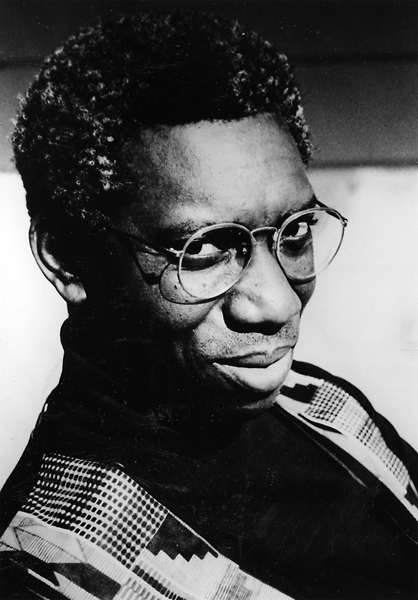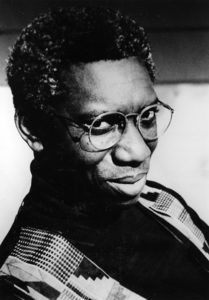Yusef Komunyakaa
With more than ten published volumes of poetry, Yusef Komunyakaa is a widely celebrated and anthologized poet.

State Library of Louisiana
Yusef Komunyakaa. Photo by Mandy Sayer.
Yusef Komunyakaa, an inductee into the American Academy of Arts and Letters with three poetry volumes named as finalists for the National Book Critics Circle Award, is a former chancellor of the Academy of American Poets and senior faculty member in New York University’s Creative Writing Program.
Born James Willie Brown Jr. in Bogalusa on April 29, 1947, Komunyakaa was one of five children. As a child he internalized nature, Louisiana’s landscapes, and the hard life of Black people. These themes, along with history, jazz, and identity, would later emerge in his work. A voracious reader since childhood, he constantly borrowed James Baldwin’s collection of essays Nobody Knows My Name from the Bogalusa library. In 1973 Brown adopted the name Yusef Komunyakaa as a tribute to his West Indies grandfather, who was believed to have reached the United States as a stowaway according to family folklore.
Vietnam
“I wonder if I would have become a poet without Vietnam.” — Yusef Komunyakaa
In 1969 Komunyakaa joined the army and was deployed to Vietnam. He served as an information specialist, or correspondent, after basic training and later as an editor for the military newspaper, The Southern Cross, and was awarded a Bronze Star for his military journalism.
Komunyakaa read poetry between reporting on the war. His 1988 book Dien Cai Dau, which means “crazy” in Vietnamese, was a term used by locals to describe American soldiers. In his highly anthologized poem, “Facing It,” Komunyakaa writes:
“… I’m inside
the Vietnam Veterans Memorial
again, depending on the light
to make a difference.
I go down the 58,022 names,
half-expecting to find
my own in letters like smoke. …”
The masterful collection is celebrated as essential reading for understanding the mental, racial, and sexual trauma of the Vietnam War.
Komunyakaa earned his undergraduate degree at the University of Colorado in 1975 through the GI Bill and a graduate degree in creative writing from the University of California at Irvine in 1980. He later taught creative writing at the University of New Orleans, where he met his wife and fiction writer, Mandy Sayer. His 1984 book Copacetic, inspired by a brief return to Louisiana and its music, catapulted him into the literary spotlight.
Returning to the Music
Komunyakaa says from as early as five years old, he would compose lyrics in his head, and he would return to his love of music throughout his career. In 1991 and 1996 Komunyakaa was the editor of The Jazz Poetry Anthologies. His poem, “Testimony,” a tribute to jazz musician Charlie Parker, was scored by an Australian saxophonist and performed by the Australian Art Orchestra in Sydney in 2002. Komunyakaa wrote librettos for the opera Slip Knot (2003) based on the lynching of a Black man falsely accused of raping a white woman. In 2013 Komunyakaa published a book with an audio CD insert called Testimony, A Tribute to Charlie Parker: With New & Selected Jazz Poems.
A Distinguished Career
With more than ten published volumes of poetry, Komunyakaa has cemented himself as a widely anthologized poet, and poems such as “Facing It,” “Grenade,” “Maggot,” and “My Father’s Love Letters” are standard in high school and college classrooms. Despite today’s technology Komunyakaa famously still writes by hand and believes the motion of writing is vital to his creative process.
His books Thieves of Paradise, Talking Dirty to the Gods, and The Chameleon Couch were all finalists for the National Book Critics Circle Award. In 1999 Komunyakaa became chancellor of the Academy of American Poets for six years. He joined New York University as a distinguished faculty member in 2006. His awards include the Wallace Stevens Award, Ruth Lilly Poetry Prize, Griffin Poetry Prize Lifetime Recognition Award, William Faulkner Prize from the Université de Rennes, Thomas Forcade Award, Hanes Poetry Prize, and two National Endowment for the Arts fellowships. He was inducted into the American Academy of Arts and Letters in 2009.
